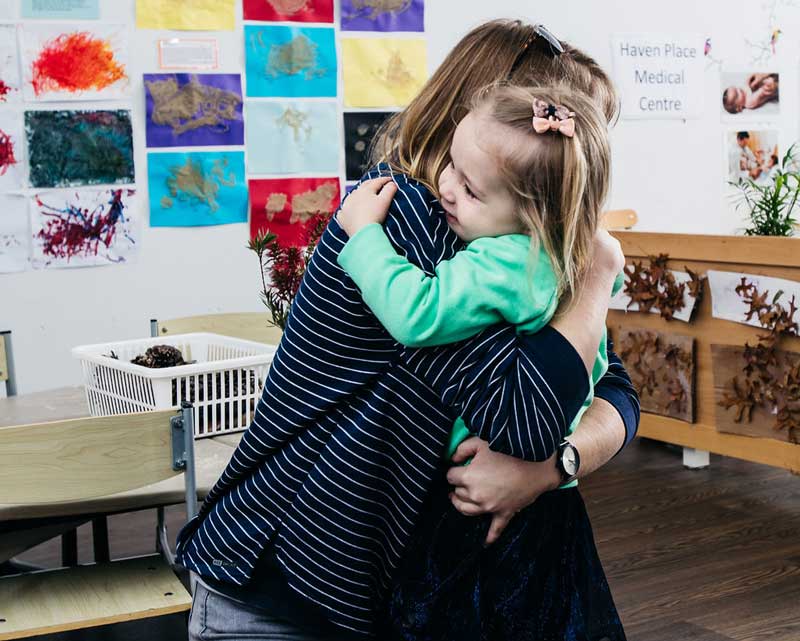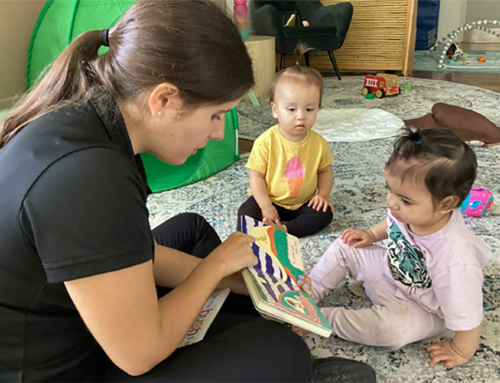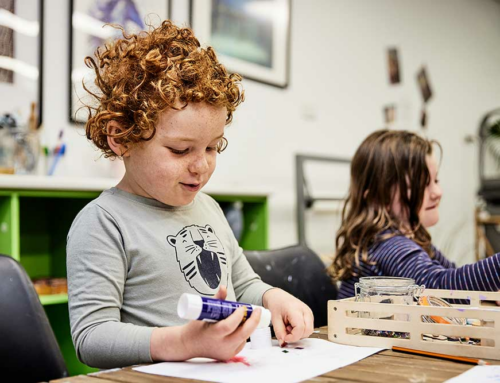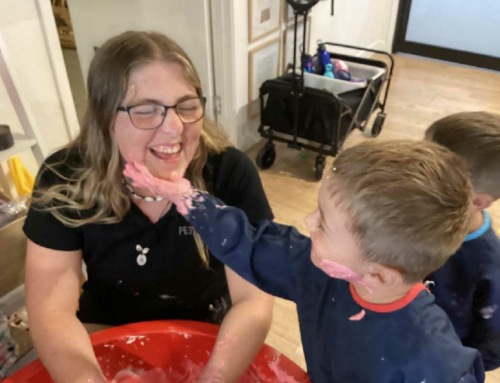When a family member has a serious illness, it impacts everyone. It’s necessary to talk to your child to lessen their fear and uncertainty from lack of knowledge. While it’s natural to want to protect them, they’ll most likely realise something is wrong.
Our instinct is to shield a child from bad news. But children pick up on our physical cues, sad and whispered conversations and disrupted routines. So how can we approach them about such a sensitive topic as the illness of a loved one, such as a grandparent or parent?
Simple, honest answers and reassurance are key to helping children understand and gain the strength they need to brave a family member’s ill health. Clear and accurate communication helps a child build resilience now and for when there’s a serious illness.
This article provides you with the steps for approaching your child about the serious illness of a loved one.

How to talk about a severe illness in the family:
1. Consider your child’s developmental stage
Taking not just your child’s age into account, but also their emotional development, will guide the choices you make on how to approach the situation. A younger child may not have the capacity to process a large amount of information or the implications. They may also question if it’s their fault.
The stage of your child’s development will change the way you approach and support their understanding. It may be easier to answer their questions in stages rather than sitting them down to tell them what’s happening all at once.
2. Collaborate with your parenting partner on how to talk to your child
Agree on what to say, how to say it and acknowledge the circumstances affecting your child. When prepared parents talk to children, it creates less confusion and provides a supportive front.

3. Plan ahead
Choose a time to discuss the illness with your child when they are least distracted. You should also be able to give your undivided attention.
Other planning might cover:
- Who will lead the conversation?
- What information does the child need to know?
- How will you say it so that the child understands what is going on?
- How will you respond to your child’s questions, including such topics as death?
4. Keep the conversation about a sick family member easy to understand
The initial conversation that you have with your child will be the first of many. Tell them the truth about a life threatening illness in terms that they will understand. Being honest and open will build their trust and give them a sense of safety.
“Uncle John has cancer and is in hospital. When someone is ill, doctors and nurses usually help them to get well. Uncle John’s illness is different because the doctors don’t think he will get better. He may die because of his illness.”
Don’t shy away from using words like die, dying or death. Keep your language straightforward and honest. Avoid confusing phrases like going away for a long time or going to sleep, as these can create unnecessary fear and confusion.
For young children, keep the information short as they don’t necessarily need all the details. Tell them the name of the serious illness and what the doctors’ expect to happen as the disease progresses.

5. Give your child time to process the information and their emotions
Encourage your child to ask any questions so you can clear up any confusions or uncertainty. Even if they ask the same questions more than once, responding with the same answer will build their trust.
Small amounts of information at different times can help younger children gain a clearer understanding of what is going on. Depending on their development, you may also want to tell them:
- How it may affect their environment or routines.
- Whether the person’s serious illness is contagious.
- How they may be able to help the family member.
Drawing a picture or creating a get well card can help your child engage with their feelings and provide a positive experience for both the child and the sick relative.
6. Share with them how you feel about it
It’s okay to show your child that you’re sad. Sharing your feelings will let them know it’s okay to show and share their own, even if they don’t yet have words for the way they feel.
Acknowledge the way your child feels and be prepared for changes in the way they act as you experience the situation together. You may notice that they take cues from you on the way they should feel.
7. Try to maintain your child’s routines and rhythms
People find comfort in everyday routines, especially children. If there are changes to be made, talk to your child about them and ask for their advice on how to make those changes.
Changes in routine might include having a close family member or friend pick them up from daycare. Choose a helper that your child is comfortable being around.

8. Reassure your child, that the serious illness is not their fault
A young child may worry that they have somehow caused the illness or that they may get it. Having honest and frank discussions while providing realistic reassurance to their questions avoids miscommunications.
Keep your child informed of any significant developments that may affect them, such as when the family member may be close to death.
Reading children’s books that deal with a chronic or serious illnesses can help provide your child with comfort and engage them in conversation. Here are some picture book suggestions with themes on a severe illness:
- Hi, My Name is Jack by Christina Beall-Sullivan (2000)
- The Magic Cure by Bridget Myerscough and Anna Ralph (2020)
- Big Tree is Sick by Natalie Slosse and Rocio Del Moral
9. Be prepared for all different types of reactions
Some children will take the news of a loved one’s illness in their stride, while others may exhibit a wide variety of emotions as they come to terms with what it means to them.
10. Talk to your child care provider for parenting help
Exchanging information with your child care centre has several benefits, including:
- Enabling your centre to monitor and help with your child’s emotions.
- Collaborating with Educators on how to respond to your child’s questions.
- Providing parenting help with changed routines.
- Finding additional community support for your child’s feelings.
- Sharing family cultural customs and beliefs on illness, dying and death.

Find support for talking about a life threatening illness
When you don’t have the answers, admit the truth. The most effective ways to support your child through a family member’s serious illness is to acknowledge how it affects them, use language appropriate to their stage of development, be patient, honest and prepared.
Don’t be afraid to ask for help. Talking to your child about a serious illness in your family is difficult. If your child is not coping, ask your medical practitioner about a referral to a mental health specialist who can help your child express their feelings.
Enlist the support of your community. Maintain your child’s playdates, inform carers and teachers, and gather close family and friends into your support group. Your child will have questions, so sharing information with your support group will create less confusion.

Discover parenting help at Petit Early Learning Journey
We take our parenting partnerships seriously at Petit ELJ. Building secure connections require open, honest and respectful interactions. We believe empowering parents as decision-makers and partners, is essential in our pursuit to provide the best care for your child.
Listening, understanding and partnering with families on things that matter is the most important part of our relationship. Your input, suggestions and feedback are always welcome. Book a tour to learn more about how we can support your child and family.






